
To be listed on the CAMPOSOL TODAY MAP please call +34 968 018 268.
article_detail
Spanish News Today Editors Roundup Weekly Bulletin August 5
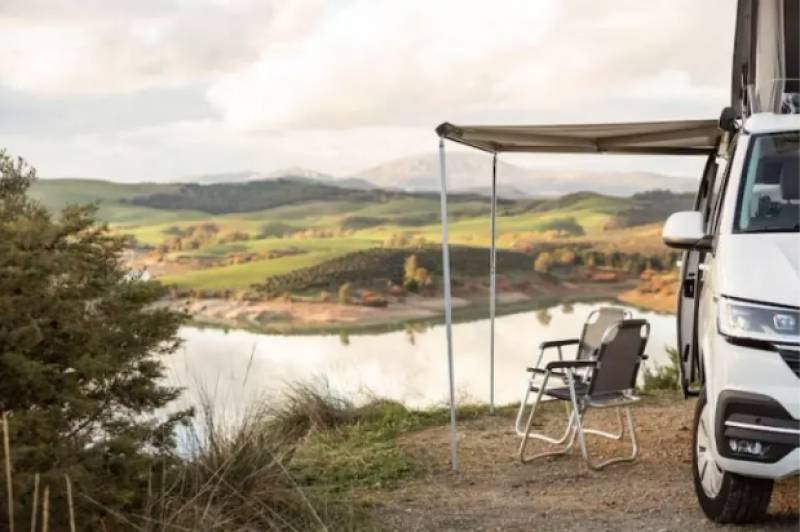
FEATURED ARTICLES: "Spain introduces new rules for parking campervans and motorhomes" and "Dog insurance mandatory in Spain from next month"
The suffocating heat of the last few weeks might be taking a little breather, but there’s still nothing in the least bit ‘normal’ about the weather. Storm Patricia has descended on Spain, incredibly the first August squall recorded in the country since the storm naming programme began way back in 2017.
Northern Spain looks set to be battered by driving rain over the next few days but elsewhere, for the most part, all we can expect is a very temporary drop in temperature before the mercury ramps up again in time for next week.
And of course, little rain will fall in the extreme south where it’s most needed and the water reservoirs are running dangerously dry.
With the weather mostly playing along, it’s very much holiday season here in Spain, a time when droves of people escape the sweltering heat of the cities in favour of the (sometimes) cooler coasts.
Campervan drivers will be happy to hear that the Spanish traffic authorities have finally decided where they’re allowed to park up, and we even have a cost-saving trick for beating the expensive motorway tolls this summer.
For those looking to travel farther afield, we’ve got plenty of exciting news about planes and trains on top of the automobiles this week.
Finally, there’s some animal magic happening next month in the form of the long-awaited Animal Welfare Law, and we’re right here to give you all the details...
Happy campers
Nothing says ‘summer’ like the lure of the open road, letting the highway ahead be your only guidebook, and travelling through Spain in a motorhome, camper or caravan has become increasingly popular in recent years.
No pesky luggage allowances to worry about, all the home comforts you can pack in and a sense of ultimate freedom that just can’t be experienced with other modes of transport. But there is always one niggling concern for camper drivers, and that’s where to park.
Understandably enough, there are regulations against so-called ‘wild camping’ in protected areas like National parks, but every now and then local town halls announce their own restrictions on where motorhomes and campervans can park up for the night. It’s hard to keep up.
So, to clear up the confusion once and for all, Spain’s traffic authorities, the DGT, have published a definitive law on what is and what isn’t allowed.
As of July 11 2023, the DGT accepts that parking is not the same as camping, and those driving bigger vehicles that can be slept in are free to stop anywhere a car or van might, once they meet the following requirements:
- If the vehicle, with the engine stopped, is only in contact with the ground through the wheels (the stabilising legs or any other devices are not used, except for the chocks, provided for by the Traffic Regulations).
- The vehicle does not occupy more surface area than it does when closed, that is, without the deployment of projectable elements, chairs, tables, etc.
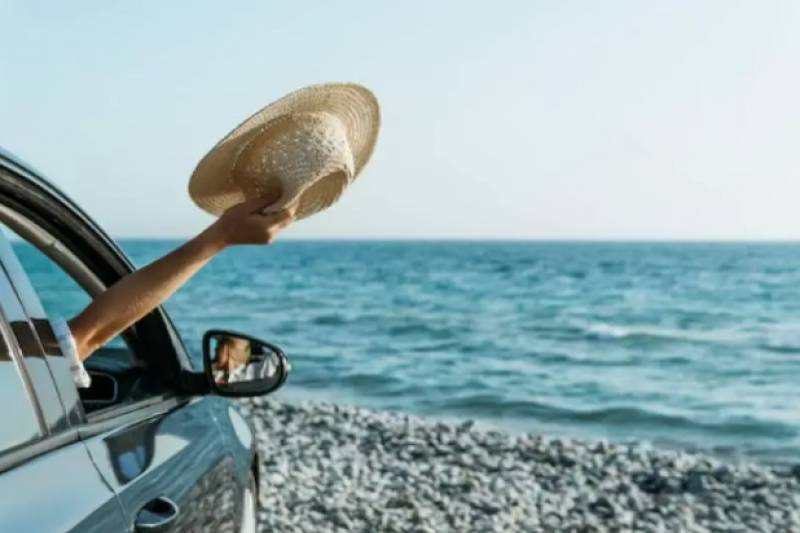
Now that you can hit the road without worrying about parking, you may be thinking about heading to the coast. In this heat, a cool beach breeze and refreshing sea spray are probably just what the doctor ordered.
If this sounds like you, then you might want to pause for just a second and consider the warning issued by vehicle experts Autobild about the damage parking too close to the beach can actually do to your motorhome or car.
Saltpeter is the mineral-heavy spray carried inland by sea breezes which can very quickly corrode bodywork. Not only that, but prolonged exposure can damage the inside of the car as well as metallic elements like the engine.
How about the irritating sand that gets into every little nook and cranny? Well, it does a fair bit more than that, since the particles can make quick work of your paint job and really scuff up the upholstery.
And that’s to say nothing of the sun: parking under the direct glare will quickly degrade plastic and excessive heat can wear the tyres out. Place a sun visor in the windscreen and always check the state of the tyres after a long stay beachside.
To get from A to B, the motorway is often a necessary evil. Sure, it can be pricey – Spain actually has some of the most expensive in Europe – but it sure saves time. But what if we were to tell you that you could zip along these high-capacity roads absolutely free?
A little-known fact is that several of the most popular motorways in the country, like those that pass through Madrid, Alicante, Cartagena and Malaga, don’t charge tolls between midnight and 6am.
Check out the full article here for the complete list of motorways you can cruise for free at night.
And don’t forget to join our Driving in Spain Facebook group for all the latest motoring and travel news.
Animal matters

It’s been an awfully long time coming, but Spain’s pioneering Animal Welfare Law enters into force next month. Among its many novelties are a ban on selling dogs, cats, rabbits etc. in pet shops, a short, free training course for dog owners and much harsher penalties for people who abuse or neglect animals.
While all of the changes are certainly for the good, one of the new regulations is giving pet owners serious paws (pun absolutely intended) for thought: mandatory insurance for dogs. That’s right, from September, anyone who owns a dog will need to get on to their insurance company and buy civil liability cover for their pooches.
While it’s possible the policy on your house already covers your dog, most people will need to take out separate cover, and this can range from around 24 euros for the most basic to 90 euros for the gold-plated package.
The coverage of these policies can reach up to 200,000 euros, and can include other benefits such as money off veterinary treatments or kennel stays if the owner has to go into hospital.
But don’t worry, those who forget to buy cover immediately will likely only receive a slap on the wrist.
However, the insurance is really a money-saving move in the long run, considering the Royal Canine Society of Spain (RSCE) estimates about 300 euros a year is spent on the health needs of every dog.
If you wanted evidence that the Animal Welfare Law is sorely needed, this next story, though hard to stomach, surely proves the point. In the Murcia municipality of Mazarrón, a woman is being investigated for the most horrendous case of animal abuse.
The sorry tale began last month, when a neighbour discovered a dead puppy close to the suspect’s house. The poor mite had been stuffed into a rubbish bin and nearby, the local woman discovered a cardboard box containing two more pups, malnourished and covered from head to toe in fleas and ticks. Although they were rushed to a vet, the young dogs didn’t make it through the night.
It was at this point that police decided to search the Mazarrón woman’s property, and there they found five more abandoned dogs in a truly sorry state, one of which appeared to have been the mother of the dead puppies. All of these animals were starving and crawling with parasites.
A formal investigation has been opened into the matter and the woman, who faces serious charges for animal abuse resulting in death, has been released on bail while evidence is gathered for her potential prosecution.
Start spreading the news...

Fancy a trip to the Big Apple? Well, New York’s going to be far easier to get to as the government has promised that direct flights will be available from the Valencian Community by as early as next year. But the news gets even better, as Tourism Minister Nuria Montes said this week that there’s enough demand to operate the US flights from more than one airport.
Could Alicante-Elche Airport soon be in a New York state of mind? Fingers crossed, we’ll keep you posted.
Sadly, the extra Valencia flights won’t be up and running in time to offer an alternative for travellers at Barcelona Airport, who are in for a world of hurt if the planned industrial action goes ahead from August 10. Security staff are planning to down tools indefinitely five days a week, for seven hours each day, if their demands for better pay and working conditions aren’t met.
Somewhere that’s getting very good publicity indeed is the Region of Murcia, which has joined forces with the Institute of Tourism (Itrem) and airline Binter to promote the area as a top tourism destination from the Canary Islands.
The new campaign will push the Region as an attractive holiday destination on Binter’s own website as well as through promotional posters at Las Palmas, Tenerife and Lanzarote airports, the on-board magazine and at local bus terminals.
Binter already flies through the Region three times a week all year round, but the plan going forward is to increase the frequency of existing flights to and from the Canary Islands and put on even more during the 2023-2024 season.
Weather woes

It’s been a funny old week weather-wise, hasn’t it? Sky-high temperatures in the 40s early on giving way to torrential rain, driving winds and fraught seas, only for the forecast to tell us to expect more smouldering heat before the weekend is out.
But before the sun petered out temporarily, tragedy struck Murcia. A 24-year old worker died from the heat on Monday July 31 while gardening on a property in the Parazuelos area of Mazarrón, very close to Lorca’s Puntas de Calnegre.
According to official reports, the young man’s colleague called the emergency services shortly after 1pm and reported that the boy has fallen unconscious.
Despite the best efforts of paramedics, the young man passed away from what was later confirmed to be heatstroke.
This was the second fatality caused by heat this summer in the Region of Murcia, after the death of a 42-year-old man of North African origin on July 20 who was picking tomatoes in a greenhouse in La Majada, a district of Mazarrón.
Storm Patricia, which landed in Spain on Thursday, has brought us a little reprieve with thermometers dropping by a few welcome degrees, but unfortunately the rain will hardly make a dent on the drought-ridden south.
The reservoirs are in dire straits, and Malaga is certainly bearing the brunt, with the storage facilities barely at 27% of their capacity. In fact, the seven dams in the area total around 165 cubic hectometres of water, which is almost half of the nearly 300 they stored this time last year.
In a desperate attempt to guarantee supply during the remainder of the summer, water restrictions and even outright cuts have been extended, now affecting one in three municipalities of the Andalucian province.
Without doubt the worst affected region is Axarquia, which is fed by the critically low La Viñuela reservoir. According to the latest data published by the Hidrosur network of the Junta de Andalucía, it is already down to 8.8% of capacity, with just 14 cubic hectometres of water stored at the moment.
In a mighty blow to Andalucia golfers, the Town Hall in Mijas has adopted a series of urgent measures this week in a bid to reduce the consumption of drinking water by 10%. One such measure is a flat-out ban on irrigating golf courses, while private citizens aren’t permitted to fill their swimming pools.
But the drought situation has now extended beyond southern Spain and for the first time in its history, the government in Catalonia has declared a state of emergency in around 20 municipalities in Girona.
To conserve supply, farmers have been ordered to completely stop irrigating their crops, while households are limited to 200 litres of water per person per day.
Murcia
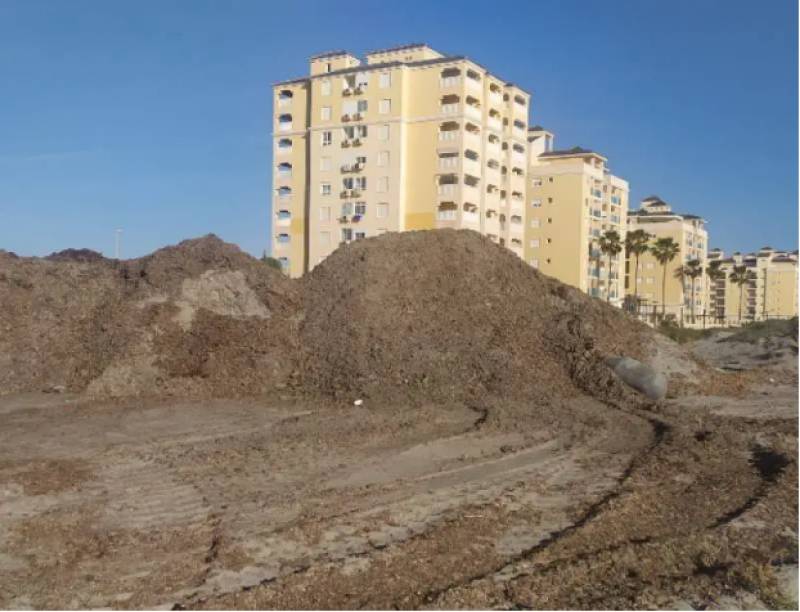
Environmental groups in the Region of Murcia were up in arms this week when the acting government refused to extend a moratorium on development around the Mar Menor, which was due to expire on Thursday August 3. The political parties of PP and VOX refused socialist PSOE’s call to extend the ban before the summer holiday period began, sparking protests and demonstrations.
Acting regional president Fernando López Miras argued that the text presented by the socialists was severely flawed and would actually mean less protection for the lagoon, but if the ban was allowed to run out, it would have meant that developers could begin submitting plans for building projects all around the Mar Menor.
Environmentalists had asked that the ban be left in place until the Territorial Planning Plan for the Vertiente del Mar Menor Basin is finally approved, but this itself has suffered countless delays. It’s understood that the Ministry of Development has reviewed the document, which among other things will regulate urban development in the Campo de Cartagena, but when it will come into force is anyone’s guess.
To great relief, the regional government appears to have given into social pressure and green-lighted a decree law that will extend the building ban in the municipalities of Cartagena, Los Alcázares, San Javier and San Pedro del Pinatar.
Announcing his decision to push ahead with extending the ban, president López Miras said there was simply a break-down in communication earlier in the week and that his party never had any intention of leaving the Mar Menor “unprotected”.
Now, the approved veto on housing and other developments will remain in place until the regional government eventually approves the Land Management Plan. However, the moratorium does not affect "expansions of consolidated urban land", understood as land already classified as urban or deemed developable and located next to consolidated urban land.
La Union residents were understandably bemused when a local man decided it would be a good idea to set up a large plunge pool right in the middle of the street, in full view of homes and nearby businesses.
The portable structure was erected along a row of car parking spaces and its owner undoubtedly had plans for a refreshing dip under the scorching Murcia sun. His idea was thwarted, however, by the arrival of police officers who warned him that he was obstructing traffic.
The suitably scolded resident quickly dismantled his make-shift swimming pool but his ordeal isn’t over yet, as the Local Police have now opened two disciplinary proceedings against him.
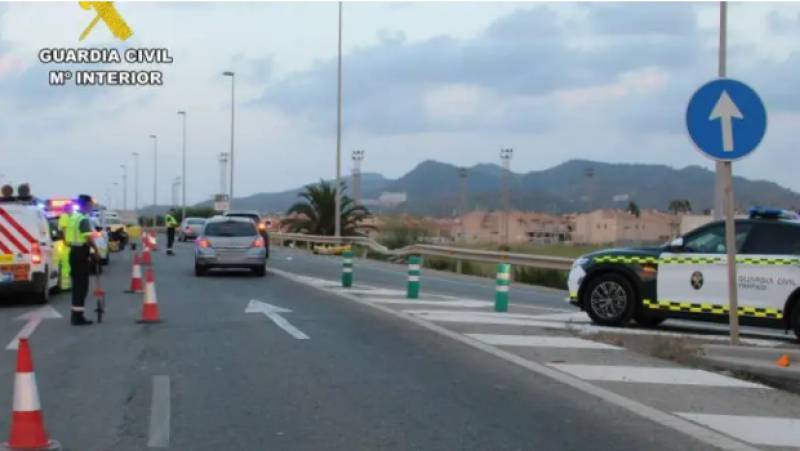 Cartagena and its surrounds were left horror-struck last Thursday when a tragic car accident resulted in the death of a young man. In the early hours of the morning, a car travelling on the busy road which joins the AP-7 with La Manga del Mar Menor lost control and bounced into the concrete divide between lanes, before careening back into the opposite barriers.
Cartagena and its surrounds were left horror-struck last Thursday when a tragic car accident resulted in the death of a young man. In the early hours of the morning, a car travelling on the busy road which joins the AP-7 with La Manga del Mar Menor lost control and bounced into the concrete divide between lanes, before careening back into the opposite barriers.The vehicle involved was a car designed to carry a maximum of five people, but seven youngsters were crammed inside at the time. One, who was travelling in the boot when the vehicle hit the barriers, was pronounced dead at the scene.
The driver, who turned out to be a 17-year-old boy, reportedly fled the scene but was quickly tracked to his home. Officers established that the youngster had never been issued a driving licence and what’s more, he tested positive for alcohol, cannabis and amphetamines.
The young driver was arrested and will be charged with crimes of reckless homicide, driving a vehicle without a licence and abandoning the scene of an accident.
Check out our EVENTS DIARY for more ideas of what to do in the Region of Murcia:
Spain
While campervan and motorhome drivers are no doubt breathing a sigh of relief that the parking situation has been clarified, there is some bad news to go with the good, and that has to do with fuel prices. The year started out promisingly enough even after the government scrapped the 20 cent per litre discount, and petrol and diesel both dropped dramatically.
 Now though, the tables have turned, and in the past week alone, petrol has increased by 2.17% and diesel has become 2.53% more expensive, the fourth consecutive fuel price rise in this country. At the current prices, filling an average 55-litre tank with petrol will set motorists back 90.75 euros while refuelling with diesel will cost 82.61 euros.
Now though, the tables have turned, and in the past week alone, petrol has increased by 2.17% and diesel has become 2.53% more expensive, the fourth consecutive fuel price rise in this country. At the current prices, filling an average 55-litre tank with petrol will set motorists back 90.75 euros while refuelling with diesel will cost 82.61 euros.Despite this most unwelcome pinch for motorists, petrol is still 3% cheaper than this time last year, while diesel costs a considerable 11.3% less today.
Sadly, the news is scarcely better for homeowners, since a new rate hike means that the average variable mortgage is set to increase by as much as 250 euros per month. The Euribor continues its incessant growth and reached 4.15% at the end of last month and worryingly, the ECB has stated that rates will be put up again in a desperate bid to curb inflation.
This escalation has been going on since the end of 2021 and has brought many Spanish households to breaking point, who have seen their mortgage repayments shoot up by a crippling 64% in the last two years.
The impact on the mortgage market in Spain is, quite frankly, staggering: The average percentage of home loans with an outstanding balance has gone from 1.14% in April 2022 to 2.86% in April of this year. What’s more, new mortgages being approved now have an average interest rate of 3.6%, more than double the figure that banks were charging this time last year.
 Meanwhile, in Barcelona, airport thieves made off with a staggering 8.5 million euros worth of loot during the week and what makes the story even more extraordinary is that this incredible amount was all stolen form a single handbag.
Meanwhile, in Barcelona, airport thieves made off with a staggering 8.5 million euros worth of loot during the week and what makes the story even more extraordinary is that this incredible amount was all stolen form a single handbag.According to police, a Russian family was waiting at the check-in desk when the woman’s Louis Vuitton purse was grabbed. Inside, the robbers found 20,000 euros in cash plus an absolute fortune in high-end jewellery and watches, including a 47-carat ring valued at more than 4.5 million euros.
As soon as the theft was reported by the frantic family, police checked the airport security tapes and quickly identified the perpetrators: a man and a woman who made their getaway in a navy blue Ford Focus rental.
The short-lived multi-millionaires were picked up by police on the AP-7 near Salt in Girona on Wednesday August 2, just hours after they made off with their haul.
Alicante

The biggest news coming out of Alicante this week is that the Valencian government has finally decided to lift the ban on smoking on outdoor bar and restaurant terraces after more than three years. The restriction was originally implemented as an anti-Covid safety measure and the Valencian Community was the last in the country to maintain it.
The news will be welcomed by many in the industry who have been pleading with the regional government to lift the prohibition for months now, claiming that preventing patrons from having a cigarette outside was damaging business.
Hospitality bosses strenuously argued that the ban should have been lifted on July 4 this year, when the Council of Ministers declared an official end to the coronavirus health crisis.
But from now on, hospitality owners will be able to choose whether or not to allow customers to smoke on their terraces.
Alicante province is notoriously short on taxis during the summer months, with tourists and locals alike routinely complaining of long queues streaming away from town centre ranks and phone calls to many cab companies often going unanswered as demand far outstrips supply.
It’s no wonder then that lots of visitors take their chances with so-called pirate taxis. These illegal drivers don’t carry an appropriate licence granted by the City Council and they also lack the unlimited liability insurance coverage that licenced drivers must have. To boot, they don’t have fixed rates so can charge whatever they like, often undercutting those taxis that operate within the law.
Three Javea drivers ran out of luck this week when local police caught them red-handed and they could now face fines of a whopping 4,000 euros each. The men, aged between 30 and 60, were all stopped at regular checkpoints and officers quickly established that they were ferrying paying customers to nightlife venues, at a time when the legal taxis were all booked out.
There was more high drama on the roads, this time in Torrevieja, when a driver mounted the kerb on Calle Concordia and ploughed into a terrace full of customers sitting outside the El Zagalico bar.
The driver got out of the car and at first, startled witnesses believed he was about to check that the customers were OK – in fact, two were injured when they were hit with bits of concrete from an exploding planter. But no: the motorist simply assessed the damage to his vehicle, and made to climb back in.
An off-duty police officer saw what was happening and he and another patron from the bar tried to stop the man from leaving. A viscous grapple ensued, during which the policeman suffered a broken nose.
The hit and run driver managed to make it back to his car and zipped away, but not before almost running down another man.
It turns out that the suspect, of Moroccan nationality, is well known to the authorities in Torrevieja and has a lengthy criminal record. A search is now on to track down his whereabouts.
Check out the Costa Blanca What’s On and Where to Go Facebook group to see more things to do around Alicante province!
Andalucía
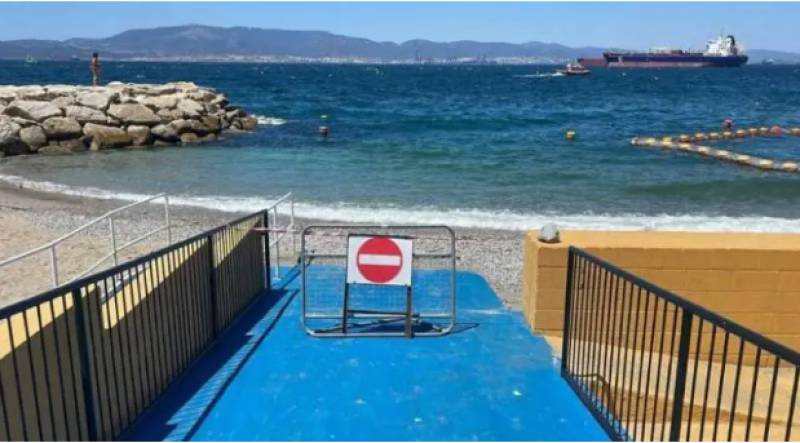
Scenes of panicked chaos emerged from Gibraltar earlier this week when a massive tanker leaked around 2,000 litres of oil in the dock, forcing the closure of several popular tourist beaches and the entire busy port.
The devastating accident occurred when the Gas Venus was refuelling and the oil tank on the ship overflowed, dumping the dangerous oil into the water. The 56-year-old captain of the vessel has since been arrested and is being investigated for a crime of pollution.
Meanwhile, the work to contain the spill continues and the port has been partially reopened. For the moment, the oil spill is confined to Gibraltar waters and no trace of hydrocarbons has reached the neighbouring Spanish beaches of La Línea de la Concepción, Los Barrios and Algeciras.
The worst of the stain reached a protected marine area although the Rock authorities confirmed that, so far, "no contaminated birds have been detected."
In Seville, police are on the hunt for five men accused of being involved in a sexual assault against a young British woman in a nightclub bathroom. Neither the victim nor the nightlife venue have been named, but the club is understood to be located in the central neighbourhood of Encarnacion, a once run-down district that has made a come-back in recent years and is now considered one of Seville’s trendiest neighbourhoods.
According to official reports, the Briton and her two friends began chatting with five men, who they described as “foreign”, in the unidentified nightclub and one of the group followed his victim into the disco’s toilets and assaulted her.
Staff at the club called the police after the victim reported the attack and she was taken to the Virgin Macarena Hospital for an examination. Officers said that the woman was in a “state of shock” when she arrived at the hospital.

You may have missed…
- Cartagena Roman Amphitheatre could be open to visitors in summer 2024.
After 2,000 years the amphitheatre is being unearthed alongside the remains of the bullring of Cartagena. - WATCH: Wild boars invade packed Marbella beach.
A packed Marbella beach was invaded by a family of wild boars this week that trundled down from the sand dunes and began rifling through rubbish bags in front of dozens of shocked bathers. - Alicante Airport opens new express parking spots at arrivals.
Located on the ground floor just outside the main building, the car park will allow drivers to stop for free for 10 minutes to wait for incoming passengers. - Earthquake fright in Lorca as 3.1 tremor hits the Guadalentin valley.
The tremor measured 3.1 on the mbLg scale and the 112 emergency services line received over 50 calls from alarmed members of the public. - Andalucia man investigated for uploading cock fighting videos.
An investigation by the Local Police of Malaga has identified a 21-year-old as the alleged perpetrator of a crime of animal abuse linked to illegal cockfighting.
That’s all for this week. Thanks for reading and be sure to tune in next week.
See you next week!
Contact Murcia Today: Editorial 000 000 000 /
Office 000 000 000


























